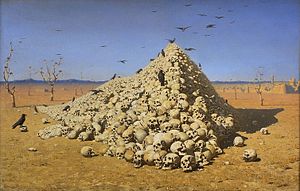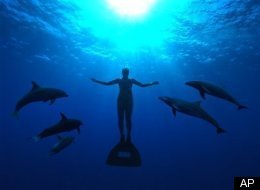'The Cove': Taiji, Japanese Village In Oscar-Winning Film, Defends Dolphin Hunting
JAY ALABASTER | 03/ 8/10 07:18 PM | 

WHAT'S YOUR REACTION?
Read More: Dolphin Hunting, Dolphin Slaughter, Japan, Oscars Best Documentary, Taiji Japan, Taiji-Dolphin-Hunt, The Cove Oscars, The Cover, Green News
TAIJI, Japan — The gala crowd in Los Angeles cheered as "The Cove" won the best documentary Oscar with its grisly portrayal of dolphin hunting. Half a world away, residents of the small Japanese village shown in the film abhorred the attention and said it won't end their centuries-old tradition.
In Taiji on the rocky coast of southwest Japan, residents gathered in whale eateries with names like "Tail" and rolled their eyes Monday when told of Oscar laurels for the film, which they see as yet another biased foreign take on their culture.
The village of 3,500 people has been hunting dolphins and whales since the early 1600s. It calls itself "Whale Town" and has a massive pair of whale statues looming over the main road. "The Cove" refers to Taiji and its dolphin fishing as "a little town with a really big secret," but local councilman Hisato Ryono said there is nothing to hide.
"Everyone around here knows about it. The water nearby turns red during the hunt. The actual killing is done in a concealed area because it is unpleasant to look at, as is true of killing cows or pigs or any other animal," said Ryono, who says he was tricked into appearing in the film.
"This is a close-knit group of fishermen. The more they feel squeezed, the more they will close off to outsiders. They won't stop this hunt because of such pressure," Ryono said.
The Japanese government allows about 19,000 dolphins to be killed each year. Taiji hunts about 2,000 dolphins every year for meat – less than other places – but is singled out in part because of its "oikomi" method of herding and killing them near the shore.
Dolphins, in addition to being food, are also recognized in Taiji as crowd pleasers with their playful nature, leading to odd contrasts. Taiji fishermen capture some to sell to aquariums, and the area is dotted with ocean cages offering dolphin bonding sessions. "Dolphin Base" charges 2,000 yen ($22) for a 20-minute session less than half a mile from the cove where hundreds of the animals are stabbed and dragged ashore in the annual hunt.
Like most residents of Taiji, the dolphin trainers repeatedly avoided talking to a foreign reporter – one young woman ran away when asked her opinion. At the nearby Dolphin Resort, a modern hotel complex with its own dolphin pool, manager Kiyo Ikeda agreed to be interviewed, as long as there were no questions about dolphins.
"We really don't get many foreign guests at this hotel," she said.
ADVERTISEMENT
Many Taiji residents said they would no longer speak to foreign visitors on the record, after years of what they felt were one-sided articles and gory pictures shown out of context.
After the movie won, the town government issued a short news release.
"There are different food traditions within Japan and around the world," the statement read. "It is important to respect and understand regional food cultures, which are based on traditions with long histories."
The documentary, directed by Louie Psihoyos, follows Ric O'Barry, a trainer for the 1960s "Flipper" TV series who says he became an activist because of a suicidal dolphin in his charge. The film team broke into a restricted area to set up cameras that captured the slaughter.
The Cove has not yet been released in Japan, but it will start showing here in June at 20 to 30 theaters nationwide. It was shown at the Tokyo International Film Festival in October, where viewers gave it mixed reviews.
Several Japanese who appear in the film, including Ryono the councilman, and Tetsuya Endo, an associate professor at Health Sciences University of Hokkaido, say they were lied to about its subject matter beforehand.
Endo, clearly angry when reached by telephone Monday, said he is considering legal action.
"I feel that they should have declined the award," he said.
Japanese government officials defended the fishermen's right to hunt dolphins and called the film unbalanced.
"There are some countries that eat cows, and there are other countries that eat whales or dolphins," said Yutaka Aoki, fisheries division director at the Foreign Ministry. "A film about slaughtering cows or pigs might also be unwelcome to workers in that industry."



